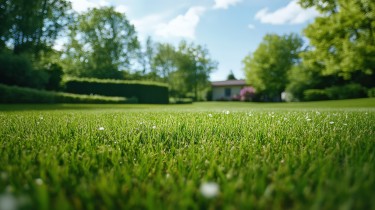

Discover the Secret to a Lush and Healthy Lawn
Read More ›
Blog
What you need to know to keep your lawn healthy and green

Having a lush, green lawn will make you the envy of the neighborhood and is your best defense against weeds, environmental stress, disease and insects. And the key to a vigorous and healthy lawn is fertilization — but knowing which kind to use (and when to use it) can be frustrating and confusing.
All plants produce their own energy from water, air and sunlight — but to thrive they rely on the nutrients they get from the soil.
But before you go running off to the garden center to pick up a bag of fertilizer, you need to know what kind of soil and grass you have. Different types of soil — such as loam, sand, clay or a combination — have different requirements when it comes to applying fertilizers.
And to complicate matters further, different grass species have different needs as well.
This blog post will help take the mystery out of lawn fertilization so you can sink your toes into a nice, thick carpet of green next summer.
Fertilizers contain the nutrients that help all plants thrive — nitrogen (N) for the leaves, phosphorus (P) for root growth and seed formation, and potassium (K) for overall health.
The three numbers you see on a bag of fertilizer indicate the percentage of nutrients it contains. For example, fertilizer marked 15-15-30 has 15% nitrogen, 15% phosphorous and 30% potassium.
There really isn’t a “one-size-fits-all” ratio when it comes to fertilizing. Each lawn is unique, so you should evaluate your soil with an accurate soil test kit. You can get these kits at most libraries in Fairfax and at various other locations in northern Virginia for around ten bucks — not a big investment for information that tells you exactly what your yard needs.
As a general rule, slow-release fertilizer is preferable. It feeds your grass over time, minimizing growth flushes and giving your lawn extended access to nutrients.

Surface soils in Northern Virginia tend to be some type of loam, which is a combination of sand, silt and clay. The perfect loam has equal parts of each — but most of us aren’t that lucky.
Soil composition matters because it determines how much water, nutrients and organic matter your soil can retain — and hence its fertilization requirements.
Again, a soil test can help determine your soil’s nutrient content. You can get one done for a small fee through Virginia Tech.

Before you can answer the “when” question, you need to know what kind of grass you are dealing with.
Northern Virginia is known as a“transition zone,” which means that both warm-season and cool-season grasses will do reasonably well — but most lawns are planted with cool-season grasses and are a blend of Kentucky Bluegrass, Fescue and Rye grasses.
It’s best to fertilize cool-season grasses when they are actively growing — lightly in early spring, and heavily in the fall. It’s not recommended to fertilize in the heat of summer, because that’s when cool-weather grasses are dormant (that’s why your lawn may look a bit patchy and brown in August).
Warm-season grasses do best with monthly applications of fertilizer starting in early spring— but be sure to stop fertilizing in late summer or early fall. You don’t want to be adding fertilizer when the lawn is going into its dormancy phase.
Pre-emergent lawn care products are used to prevent annual grasses and broadleaf weeds from germinating and becoming a nuisance and ruining your lawn.
These products are best applied in late February or early March, just before they germinate. It’s far easier to prevent them from growing than it is to pluck them from your lawn all summer!

As you can see, proper fertilization is one of the most important things that can be done to ensure your grass is healthy, green and strong.
If you’d like to care for your lawn yourself, I recommend you check out A Virginian’s Year-Round Guide To Yard Care. It’s full of useful information to help get you the lawn of your dreams.
But if you want to have a great lawn without the hassle of:
Check out our Lawn and Garden Care Programs and give us a call or request a free quote.
The lawn care specialists at Brandon Rushing will take care of everything for you — so all you need to do is sit back and enjoy spending time in your yard with your family and friends.
Written by Brandon Rushing, Founder & President
Posted on: November 1st, 2021